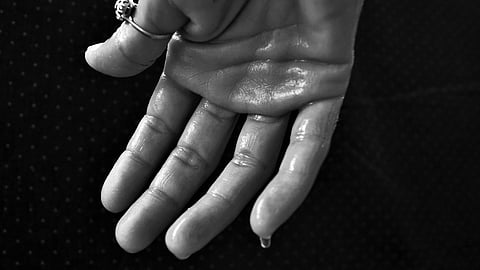

Hyperhidrosis is a condition characterized by excessive sweating unrelated to exercise or heat. Heavy sweating can hinder day-to-day activities and also be a cause of social anxiety and discomfort but it is rather common than not.(2)
There are two types of Hyperhidrosis
1. Primary focal hyperhidrosis
This is a chronic skin condition caused due to genetic mutation. And is the most common type. The areas affected are the armpits, hands, feet, and face.
2. Secondary generalized hyperhidrosis
Generalized hyperhidrosis is excessive sweating secondary to an underlying condition like Diabetes Mellitus, Parkinson's disease, or a side effect of medications like naproxen.(1)
Sweat is an odorless liquid that is released from eccrine sweat glands. We release sweat to regulate our body temperature which is why we sweat more in hot temperatures. So it is a protective measure to prevent our bodies from overheating. Sweating is caused by stress, anxiety, hot temperatures, and exercise.(1)
What causes this condition?
Overactivity of the sweat glands causes hyperhidrosis.
Medical conditions that cause hyperhidrosis are Diabetes, Hyperthyroidism, TB (tuberculosis), Anxiety, menopause, obesity and Parkinson's disease.
Hyperhidrosis can also be caused by genetic inheritance.
Some medications like naproxen, omeprazole, levothyroxine, albuterol.(1),(3)
Symptoms of this condition include:
Excessive sweating on your palms, hands, underarms, face, and body. This can further lead to body odor, itchiness, and skin infections.(3)
How can we manage this condition?(1)
Antiperspirants
These are OTC deodorants that can help reduce the swear and are best when applied during the night.
Showering or bathing more often
Choosing more breathable clothes
Cotton is a better fabric as it is more breathable and clothes with polyester which traps heat must be avoided.
Medications
Glycopyrrolate and oxybutynin which are anticholinergic agents can be prescribed but have side effects like blurred vision, dry mouth and dry eyes.
Iontophoresis
It Is a special device that allows low electric current through water to block sweat glands.
Botox injections
This is injected into an overactive never and can stop the sweat production for months at a time but repeated treatments are necessary and can be expensive.
Surgery
If other treatments fail, surgical removal of sweat glands can be done. Surgery is permanent and carries risks.(2)
In the following video, Dr. Zion Ko Lamm, MD Internal medicine talked about her insights on the treatment of Hyperhidrosis.
Dr. Zion Ko Lamm shared that antiperspirants are the best treatment and work the most when used at night as the sweat glands are less active during the night. She also mentioned that topical and oral anticholinergic are also helpful as they inhibit nerve transmission to the sweat glands. However, Anticholinergic can cause certain side effects like blurry vision, dry mouth, and urinary issues. She added that as a last resort, Botox injections can be used instead of surgery but they can be painful and expensive. Since they temporarily block the nerve supplying the sweat gland, it has to be done repeatedly.
Hyperhidrosis, or excessive sweating, can severely affect daily life, causing physical discomfort and emotional distress. If sweating disrupts daily activities, causes social anxiety, or over-the-counter antiperspirants are ineffective, it's time to see a doctor. Persistent night sweats or skin problems like infections also warrant medical attention. Early consultation can lead to effective treatments and improved quality of life.
References
Professional, Cleveland Clinic Medical. “Hyperhidrosis.” Cleveland Clinic, n.d. https://my.clevelandclinic.org/health/diseases/17113-hyperhidrosis. (Cited on 11/07/2024)
Johns Hopkins Medicine. “Hyperhidrosis,” June 17, 2024. https://www.hopkinsmedicine.org/health/conditions-and-diseases/excessive-sweating.
“Hyperhidrosis: 6 tips dermatologists give their patients,” n.d. https://www.aad.org/public/diseases/a-z/hyperhidrosis-self-care. (Cited on 11/07/2024)
https://www.instagram.com/reel/C3DsHU2uQQ9/?igsh=ejlieGhlM2F6bDR2 (cited on 13/07/2024)
MSM
